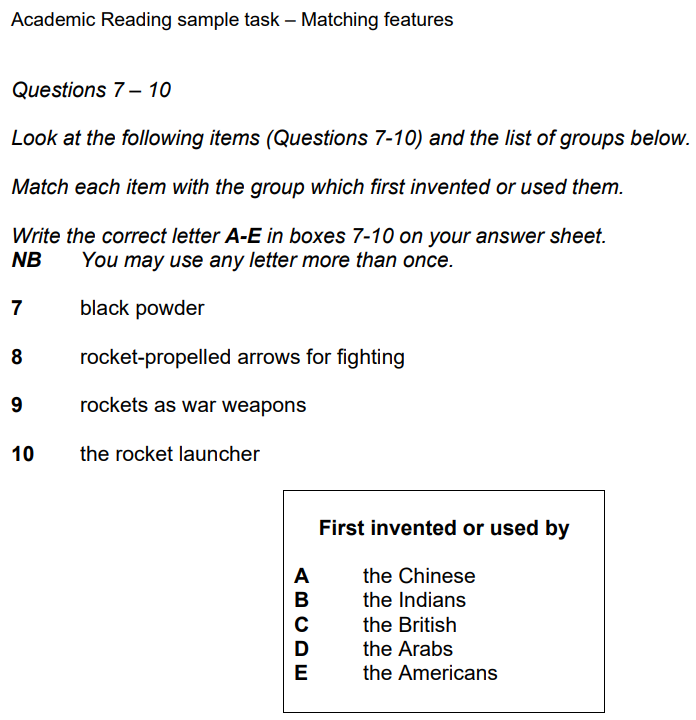Matching features questions check how well you can spot connections between facts in a text. They also assess your ability to identify theories and opinions.
This article provides a step-by-step guide on how to handle this question type so you can approach the IELTS Reading test with confidence.
What are matching features questions in the IELTS Reading test?
Matching features questions can appear in both the IELTS Academic and IELTS General Training tests. In this question type, you match statements to a list of features from the text, which are labelled with letters (A, B, C, etc.).
As an example, you might be asked to match a list of people with different statements, or match descriptions of inventions to the countries where they were invented.
You'll need to skim and scan the reading passage to find key information, then read closely to understand the details.

Source: Free IELTS Academic Reading sample preparation questions | IDP IELTS
How to match features in IELTS Reading
Let’s look at the best way to tackle this type of question, using the question on the invention of rockets above.
Step 1: Read the instructions carefully
How many questions do you need to answer?
Can you use the options more than once?
In the example above, there are four questions to answer and five options to choose from. You can use each option more than once if you need to.
Step 2: Highlight keywords in the questions and options
Underline important content words in both lists.
Think of synonyms or other ways of saying the words you’ve underlined.
Tip: In the IELTS Reading test, remember that the text often uses different words or phrases from the question, so look out for paraphrasing.
For example, for question 9 you might have underlined ‘war weapons’ as keywords.
9. rockets as war weapons.
If you look at this extract from the reading passage, you won’t find the exact phrase ‘war weapons.’ Instead, you’ll see this has been paraphrased in two different ways (see underlined phrases).
It was not until the eighteenth century that Europe became seriously interested in the possibilities of using the rocket itself as a weapon of war and not just to propel other weapons. Prior to this, rockets were used only in pyrotechnic displays. The incentive for the more aggressive use of rockets came not from within the European continent but from far-away India, whose leaders had built up a corps of rocketeers and used rockets successfully against the British in the late eighteenth century.
Step 3: Scan the text for keywords
Read through the text quickly and underline the key words from the questions or options so you can find them quickly.
Tip: If keywords appear in different forms in the text, underline these too.
For instance, the options for this sample question include a list of nationalities. However, in the text, these are sometimes referred to by country:
The Chinese – China
The Indians - India
Step 4: Read the text in detail
Check the text for any synonyms/paraphrased expressions of the keywords you underlined.
Read the text carefully to find the correct answer.
Take care: Since keywords like names and dates may be repeated, read all the sections where they are mentioned in a text.
For example, one of the options for this rocket sample question is ‘the British.’ If you read the text, you’ll see this keyword is mentioned throughout the second paragraph. However, when you read the passage closely, you’ll see that ‘the British’ is not the correct answer to any of the questions.
Matching features IELTS Reading practice
You’ll need to use a range of reading skills to answer matching features questions, but when you focus on meaning rather than exact words, you’ll be able to pair information more accurately.
By practising this question type, you get better at scanning for keywords, linking ideas and recognising paraphrasing —skills that make you a more confident reader beyond the IELTS test.
Want to check how your reading skills measure up?
Visit our IELTS Prepare Hub for IELTS Reading practice tests.
